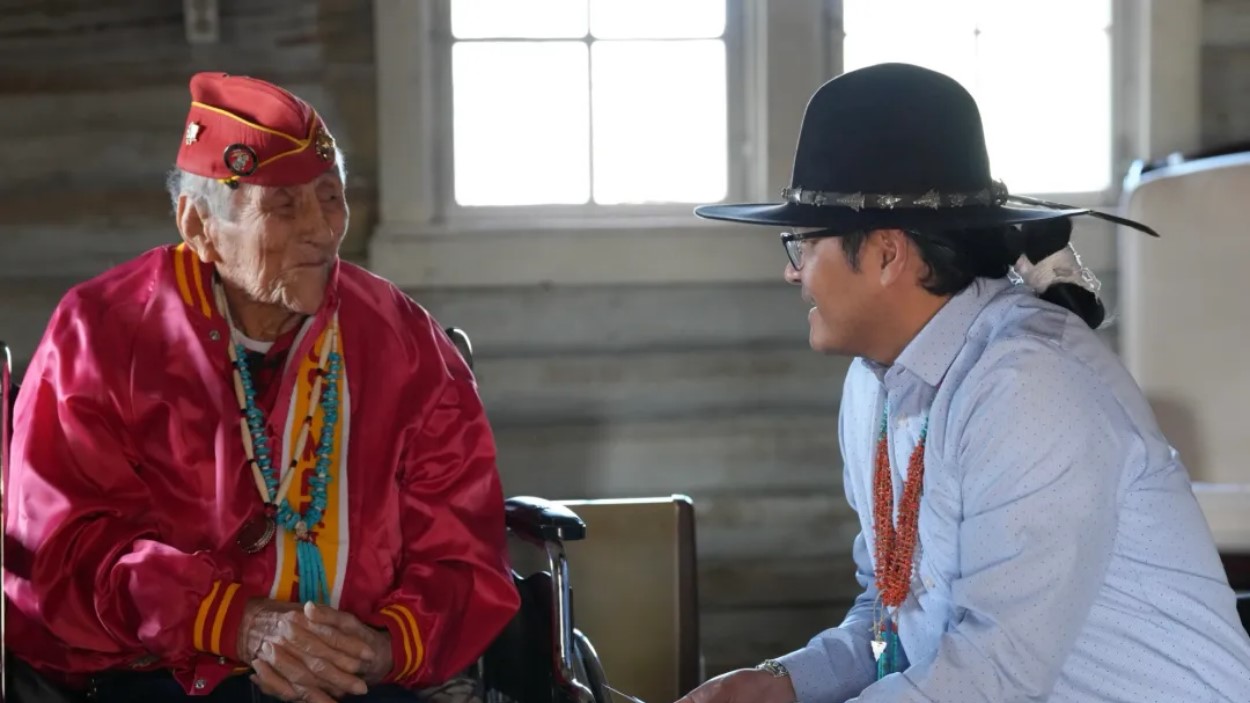

One of the last three Navajo code talkers of World War II is dead. John Kinsel Sr., a Marine Corps veteran, died at his home in Lukachukai, Arizona on Saturday, Oct. 19. He was 107.
Kinsel grew up in a rough childhood. He went on to join the United States Marine Corps, becoming part of the second group of Navajo code talkers, helping the military to further revise the code, and then saw action in some of the most important and bloody battles in the Pacific during World War II.
“Mr. Kinsel was a Marine who bravely and selflessly fought for all of us in the most terrifying circumstances with the greatest responsibility as a Navajo code talker,” Navajo Nation President Buu Nygren said in a statement. “He fought alongside his brothers in arms, for the U.S. Marine Corps, for the United States and to protect the Navajo Nation in a time of war.”
During World War II the military turned to Native Americans to help develop codes based on their languages that could be secure and hard for enemy forces to break. More than 400 Native Americans took part in the war as code talkers, with the Navajo or Diné language as the primary language used to develop the system. The code talkers would relay troop movements, important information and orders of battle. Their contributions proved essential in keeping American communications secure and unbroken by the Japanese military.
Subscribe to Task & Purpose today. Get the latest military news and culture in your inbox daily.
John Kinsel Sr. was born in Lukachukai, Arizona. His father and a younger brother died when he was young. After finishing high school and with World War II underway, he enlisted in the Marines in 1942. After finishing boot camp, he was given an envelope saying to report to Camp Elliott. He had no idea what was in store for him there.
“All we know is we’re just going to go up there. I guess there was a training ground up there,” he said in an interview for the Library of Congress.
He was approached by a white man who started questioning him in Navajo. The man turned out to be World War I veteran and former missionary Phillip Johnston, who came up with the idea of building a code on the Navajo language. The Navajo servicemembers were the ones who designed the code itself. The code talkers had been established in May 1942. Kinsel was part of the second batch of Marines to join the code talkers. After more training, he deployed with the 9th Marine Regiment, 3rd Marine Division. His service would take him to Guadalcanal, Guam and Bougainville. In 1945, he landed on Iwo Jima. The Marines had already been on the island for a few days, but fighting was intense and Kinsel was soon thrust into some of the worst combat of World War II.
During fighting on Iwo Jima he was wounded when Japanese forces blew up a cave network, sending rocks flying that hit him. He would not be awarded the Purple Heart until 1989. Iwo Jima would be his last battlefield. He continued with the Marines for the rest of 1945, making it back to the United States in the winter.
He left the Marines at the start of 1946 with the rank of corporal and returned home to Arizona. When he returned home, his uncle at first did not recognize him, he recalled. A medicine man in the community held a ceremony for him, welcoming him back to his home. After the war, he worked in education and remained an active part of his community. In 2001 he was awarded the Congressional Silver Medal for his service during World War II.
“He lived a very long, full and accomplished life,” Kinsel’s son Ronald wrote, per the Navajo Nation. “What he and the other Code Talkers accomplished changed the course of history, and will always be remembered, and I will continue to tell his legend and greatness.”
Nygren ordered the flags on the Navajo Nation to be lowered to half staff until sunset Sunday, Oct. 27 in honor of Kinsel.
Only a few Navajo code talkers are left. Samuel Sandoval died in 2022 at the age of 98. With Kinsel’s death, only two remain: Peter MacDonald and Thomas H. Begey.
The latest on Task & Purpose
- Inspired by son, father reenlists in Navy 20 years later
- National Guard major sets burpee world record
- National Guard investigates Black Hawk filmed flying low over hurricane relief site
- Why Lionel Richie’s face is on the side of a Chinook in North Carolina
- How Moody Air Force Base rode out a direct hurricane hit
